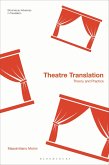This book explores the impact that high-profile and well-known translators have on audience reception of translated theatre. Using Relevance Theory as a framework, the book demonstrates how prior knowledge of a celebrity translator's contextual background can affect the spectator's cognitive state and influence their interpretation of the play.
Three canonical plays adapted for the British stage are analysed: Mark Ravenhill's translation of Life of Galileo by Bertolt Brecht, Roger McGough's translation of Tartuffe by Molière and Simon Stephens' translation of A Doll's House by Henrik Ibsen. Drawing on interviews, audience feedback, reviews, blogs and social media posts, Stock examines the extent to which audiences infer the celebrity translator's own voice from their translations. In doing so, he adds new perspectives to the long-standing debate on the visibility of the translator in both the process of translating and the reception of the translation.
Celebrity Translation in British Theatre offers an original approach to theatre translation that sheds light on the culture of celebrity and its capacity to attract new audiences to plays in translation.
Three canonical plays adapted for the British stage are analysed: Mark Ravenhill's translation of Life of Galileo by Bertolt Brecht, Roger McGough's translation of Tartuffe by Molière and Simon Stephens' translation of A Doll's House by Henrik Ibsen. Drawing on interviews, audience feedback, reviews, blogs and social media posts, Stock examines the extent to which audiences infer the celebrity translator's own voice from their translations. In doing so, he adds new perspectives to the long-standing debate on the visibility of the translator in both the process of translating and the reception of the translation.
Celebrity Translation in British Theatre offers an original approach to theatre translation that sheds light on the culture of celebrity and its capacity to attract new audiences to plays in translation.









